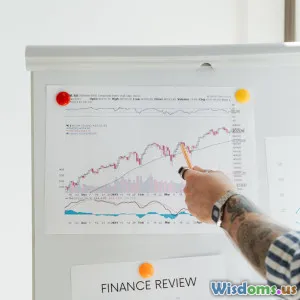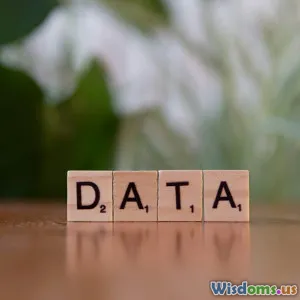
Blockchain Beyond Crypto Business Uses You Did Not Consider
8 min read Discover innovative blockchain business applications beyond cryptocurrencies you haven't considered. (0 Reviews)
Blockchain Beyond Crypto: Business Uses You Did Not Consider
Blockchain technology is often synonymous with cryptocurrencies like Bitcoin and Ethereum. Despite the spotlight on digital currencies, blockchain's potential extends far beyond crypto trading and investments. This distributed ledger technology can transform traditional industries by enhancing transparency, security, and efficiency in ways rarely discussed. In this article, we'll uncover powerful blockchain applications that many businesses overlook, from supply chain management to healthcare and voting systems.
The Blockchain Revolution Beyond Cryptocurrency
Ever since blockchain's inception as the underlying technology for Bitcoin, entrepreneurs and developers have dreamed of harnessing its power throughout various sectors. Yet, many business leaders remain focused on crypto assets, missing the bigger picture of blockchain’s game-changing capabilities.
At its core, blockchain is a decentralized, tamper-proof database. This means information stored on a blockchain network is immutable and accessible to authorized participants, creating unparalleled trust in data authenticity.
Why Look Beyond Crypto?
- Broader utility: Blockchain isn’t restricted to financial transactions.
- Increased business efficiency: It eliminates intermediaries, reducing costs and delays.
- Enhanced security: Cryptographic security lowers fraud risks and data breaches.
By exploring blockchain beyond cryptocurrencies, companies can solve longstanding problems and gain competitive advantages.
Supply Chain Transparency: Tracking Every Step
One of blockchain’s most practical applications lies in improving supply chain management. Transparency, provenance verification, and real-time tracking are pivotal for modern consumers seeking ethically sourced and authentic products.
Food Safety and Origin Verification
In 2018, Walmart partnered with IBM’s Food Trust platform to track produce through blockchain. This initiative significantly reduced the time required to trace contaminated lettuce from six days to mere seconds. Blockchain records every checkpoint—the farm, distributor, warehouse—providing an immutable audit trail.
Combating Counterfeit Goods
Luxury brands and pharmaceuticals face billions worth of losses annually due to counterfeit products. Blockchain empowers brands to create digital certificates of authenticity tied to physical goods. For instance, LVMH uses the Aura blockchain to authenticate designer products, reassuring customers and challenging counterfeiters.
Real-Time Inventory Management
Blockchain's transparent data ledger allows stakeholders across geography to monitor inventory levels harmoniously, reducing overstocking or shortages. This reduces costs and improves customer satisfaction by ensuring product availability.
Healthcare: Securing and Sharing Patient Data
Healthcare data remains one of the most sensitive and fragmented information types. Blockchain offers a way to share patient records securely among authorized professionals while keeping patients in control of their data.
Improved Data Interoperability
Many hospitals use different systems, making record sharing cumbersome. Projects like Estonia’s E-Health Foundation use blockchain to enable seamless data exchange while maintaining privacy and compliance with GDPR.
Patient-Centric Control
Blockchain-based solutions provide patients with access permissions through private keys, letting them decide who sees their medical history. This decentralization reduces administrative overhead and empowers patients.
Pharmaceutical Supply Chain and Research
Clinical trials and drug manufacturing processes can be registered on blockchains to ensure data integrity and prevent tampering. This accelerates research validation and builds trust.
Digital Identity: A New Standard for Verification
Digital identities are crucial for accessing banking, government services, education, and more. Conventional identity verification processes depend on centralized databases vulnerable to hacks and fraud.
Self-Sovereign Identity Models
Blockchain enables "self-sovereign identity," where users own and control their digital identity without intermediaries. Platforms like Microsoft’s ION or Sovrin Foundation provide decentralized identifiers (DIDs) that anyone can verify instantly.
Eliminating Identity Theft and Fraud
Immutable blockchain records reduce the risk of identity tampering. For example, Dubai’s government aims to have all residents’ digital identities on blockchain to streamline public services and improve security.
Easier KYC for Businesses
Companies struggle with repetitive Know Your Customer (KYC) steps. Blockchain allows sharing verified identity records securely across organizations, cutting onboarding time and costs.
Smart Contracts: Automating Agreements and Processes
Smart contracts are self-executing digital contracts with terms written directly into code. They automatically trigger actions when conditions are met, eliminating human errors and delays.
Insurance Claims Processing
For example, in travel insurance, smart contracts can automatically reimburse customers when a flight delay is verified through trusted data oracles, reducing paperwork and speeding payouts.
Real Estate Transactions
Smart contracts help automate property sales by bulk releasing payments upon successful registration of ownership transfer, simplifying escrow and increasing trust between buyers and sellers.
Supply Chain Finance
Suppliers can get paid promptly once blockchain verifies delivery milestones without waiting for manual approvals, improving liquidity.
Voting Systems: Transparent and Tamper-Proof Elections
Election transparency is key to democracy. Blockchain’s tamper-evident ledger makes it ideal for securing votes to prevent fraud and bolster trust.
Pilot Projects and Case Studies
In 2019, West Virginia experimented with blockchain voting for overseas military personnel, allowing secure remote voting via mobile applications. Though challenges remain, successful pilots demonstrate blockchain's potential to tackle voter suppression and increase participation.
Immutable Audit Trails
Each vote on the blockchain is recorded and cannot be altered, enabling easy auditability and accountability.
Privacy-Preserving Voting
Advanced cryptographic techniques enable anonymity while providing proof that votes were legitimately cast.
Conclusion: Embracing a Blockchain Future Beyond Crypto
While cryptocurrencies grabbed headlines, blockchain’s enduring value lies in its transformative impact across diverse industries. From ensuring food safety and authentic medicines to securing patient records and reinventing digital identity, businesses have vast opportunities to leverage blockchain’s trust and transparency.
Early adopters who explore these lesser-known avenues position themselves as innovators ready for a future that demands enhanced security, efficiency, and accountability.
As IBM’s former CEO Ginni Rometty said, "Blockchain is a foundational technology... We’re on the cusp of something tremendous."
To stay competitive, business leaders must see blockchain not just as a crypto enabler, but a powerful tool redefining business practices worldwide.
Take Action:
- Conduct a blockchain feasibility study for your operations.
- Partner with credible blockchain platforms to pilot projects.
- Educate teams about decentralized systems and their benefits.
Dive into blockchain innovation today and transform unseen challenges into opportunities for growth and trust.
Rate the Post
User Reviews
Popular Posts




















